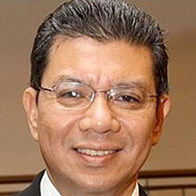November 17 is International Students’ Day. On that day, Ikram Siswa (Ikram Student) launched a campaign to uphold academic freedom in Bangi, Selangor. I was grateful I was invited to deliver the keynote address.
November 17 was chosen because on that date, in 1939, Nazi German stormed the University of Prague, Czechoslovakia and executed nine people (eight students and one lecturer), followed with the sending of more than 1,000 students to concentration camps and the closing of all Czech universities. The nine victims were demonstrating against an earlier killing of another student, Jan Opletal, and others who were celebrating the anniversary of the independence of Czechoslovakia.
The date was first observed as International Students’ Day in 1941 in London, by the International Students’ Council. Today, its major promoters are the International Union of Students (successor of the International Students’ Council) and National Unions of Students in Europe which, together, are lobbying to make the day an official United Nations observance.
I wish to congratulate Ikram Siswa because, to the best of my knowledge, this is the first time this day is commemorated in Malaysia.
The campaign saw seven student fronts collaborating. They are: Ikram Siswa, National Union of Malaysian Muslim Students (PKPIM), Federation of Malaysian Muslim Students (Gamis), Universiti Malaya Student Union (PMUM), Youth Democratic Movement of Malaysia (Dema), Student Solidarity of Malaysia (SMM) and Universiti Malaya Muslim Students Association (PMIUM).
According to Cary Nelson, in his book “No University Is an Island: Saving Academic Freedom”, “academic freedom comprises three elements: freedom of inquiry and research; freedom of teaching within the university; and freedom of extramural utterance and action”. These must be enabled without being targeted for repression, job loss or imprisonment.
Academic freedom sustains the modern university in terms of its independence, soul, culture, objectives, quality and excellence. Unfortunately, the university is constantly under siege from all corners, either by external interference or by internal decision-making problems, hence the need for continuous struggle for academic freedom.
The highlight of the campaign launch was a forum featuring four student organisations’ presidents as panellists: Marwan Abdullah (Ikram Siswa), Mohd Fazril Mohd Salleh (PKPIM), Fahmi Zainol (PMUM) and Abd Malik Abd Razak (Gamis, represented by Mohd Imran Ishak). It was moderated by Mohd Fikri Ahmad (Member of Youth Parliament).
Solidarity with worldwide student movements, activism and struggles is very important. This is because many student activists face a lot of tribulation. Many were dismissed, harmed and even executed throughout the long history of student activism, such as the fight for independence, anti-war movements, anti-nuclear arms, pro-environment, pro-democracy, etc. In the context of the Arab Spring, for example, there are reports that a number of students have been sentenced to death and more than 600 have been dismissed from their universities.
Student activists in Malaysia are luckier. But they have not been spared either, especially by draconian laws, like the now repealed Internal Security Act (ISA). SMM had a couple of years ago declared June 8 Students’ Human Rights Day. This was to mark the day when seven student activists who demonstrated against the ISA on June 8, 2001 were detained and charged under the Police Act and dismissed from their respective universities.
Many were victimised under the now repealed Section 15 of the University and University College Act (UUCA). A few are now being investigated and charged under the Sedition Act while many more faced disciplinary procedures that were sometimes unfairly administered by some university administrators.
Solidarity with international student movements is also very important for the purpose of sharing best practices. If I may borrow from what Meredith L. Weiss wrote in her book “Student Activism in Malaysia”, due to the nature of student movements “which require constant recruitment, face a certain cycle of issues and need ongoing redefinition and renewal”, it is better to learn from others rather than re-invent the wheel.
This sense of solidarity is crucial because it feeds into the normative forces that shape the culture, nature and future of our student movements: learn from each other, motivate and inspire in propelling our contemporary debates, decisions and actions to a much higher level.
Sadly, the guarantees of academic freedom are rarely given on a silver platter. They are often something that has to be bitterly fought for, carefully negotiated and steadfastly held to. It was Socrates who long ago preferred death by poisonous hemlock and to preserve his freedom to inquire rather than bend to the will of the politicos of Athens.
I am not saying that we have to go so far. But it is just to expect that the road to such hard-won freedom will not come easy, and it is with steps like the Bangi programme that we can stay the course and inch forward towards achieving the desired results. – December 1, 2014.
* Saifuddin Abdullah is CEO of Global Movement of Moderates (GMM) and former deputy minister of higher education. He is active on twitter: @saifuddinabd.
* This is the personal opinion of the writer or publication and does not necessarily represent the views of The Malaysian Insider.


Comments
Please refrain from nicknames or comments of a racist, sexist, personal, vulgar or derogatory nature, or you may risk being blocked from commenting in our website. We encourage commenters to use their real names as their username. As comments are moderated, they may not appear immediately or even on the same day you posted them. We also reserve the right to delete off-topic comments